#The Egyptian Antiquities Murder
Explore tagged Tumblr posts
Text
Murder Among the Pyramids by Sara Rosett
Murder Among the Pyramids by Sara Rosett
Escape on an Egyptian Excursion to the Land of the Pyramids! Tour highlights include: Hieroglyphics and high tea in the desert, followed by murder after sunset . . . Title: Murder Among the Pyramids Series: 1920s Lady Traveler in Egypt Book 1 Author: Sara Rosett Genre: Cozy Historical Mystery It’s 1924 and Blix Windway has made a career out of her wanderlust, giving lectures to ladies’ groups…
#1920s High Society Lady Detective Mysteries#1920s Lady Traveler in Egypt Book 1#An Old Money Murder in Mayfair#Book Reader Giveaways and Contests#Cozy Historical Mystery#Murder Among the Pyramids by Sara Rosett#Murder at Archly Manor#Murder at Blackburn Hall#Murder at the Mansions#Murder in Black Tie#Murder in the Alps#Murder on a Midnight Clear#The Egyptian Antiquities Murder
0 notes
Photo

This is another depiction of mine of the scholar Hypatia of Alexandria, who lived and studied in Roman Egypt during the fourth to early fifth centuries AD.
A teacher and scholar of Neo-Platonic philosophy who also built scientific instruments such as astrolabes and hydrometers, she became an adviser to the Roman prefect Orestes, whose conflict with the Christian bishop Cyril would ultimately drag her into the early Christian community’s crosshairs. Hypatia would face a brutal death in 415 AD at the hands of a Christian mob who had her stripped naked and assaulted with ostraka (possibly meaning either roof tiles or oyster shells), dragged through the streets of Alexandria, and set her remains on fire. Some historians have claimed Hypatia’s murder represents the “death of classical antiquity” at the hands of religious fanaticism, but it should be noted that the mob’s reason for targeting Hypatia had more to do with her alliance with Orestes, himself a Christian, than anything she had taught as a scholar and philosopher.
We do not know much about Hypatia’s background other than that she had a father named Theon, and her physical appearance remains unknown to the best of my knowledge. Although her name is of Greek origin, there are records of indigenous Egyptians, Jews, and other non-Hellenes in Egypt assuming Greek names during the Greco-Roman periods, so I believe it is possible that Hypatia was of Egyptian (or other African) descent rather than strictly Greek as commonly shown in artistic portrayals.
--- Brandon S. Pilcher, aka TyrannoNinja
117 notes
·
View notes
Text

The Hunt: Cleopatra’s Long-Lost Tomb
The Egyptian queen may rest in the ancient city of Alexandria, which now lies at the bottom of the Mediterranean.
She has one of the most captivating and enduring mythologies of any leader in history, yet the true end of Queen Cleopatra’s story remains an enigma. Archaeologists might be able to offer some clarity, if they could only find her final resting place.
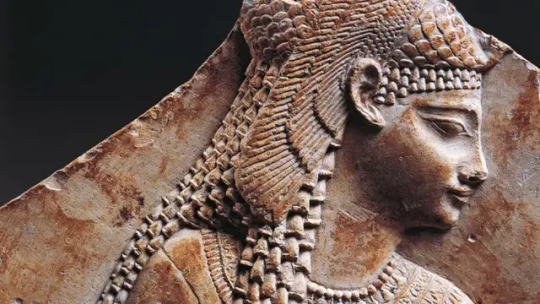
The location of the Queen of the Nile’s tomb has eluded experts for centuries. Napoleon famously led an expedition searching for the crypt in the early 19th century. Egyptologists widely believe it is hidden somewhere in Alexandria, where the missing tombs of all 14 of the Ptolemaic Pharaohs, the final dynasty of ancient Egypt, are expected to be. Alas, much of ancient Alexandria now lies at the bottom of the Mediterranean Sea.
Greek historian Plutarch indicated that when Emperor Octavian ended a civil war by defeating Cleopatra and her beloved husband, the great Roman general Mark Antony, he allowed for them to be buried together. Though the prospect of finding both of their physical remains is thrilling, Plutarch wrote of their death and burial several decades after their occurrence, which casts his words into doubt.
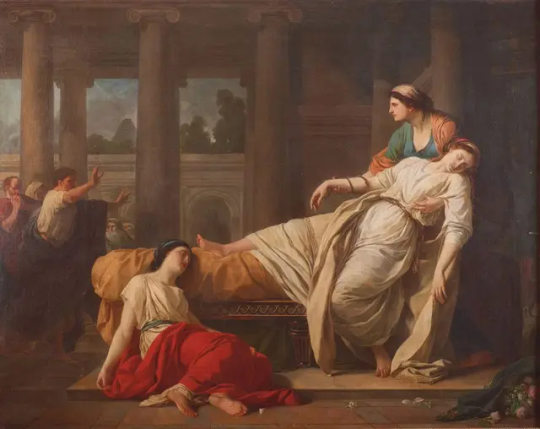
Many Egyptologists accept that both the Queen and her royal consort died dramatically by suicide, she by snakebite and he by his own sword. Others speculate that she died by intentional drug overdose, or by stinging herself with a poison-tipped hairpin. A growing number of experts suspect the suicide is a cover-up—that perhaps the queen was murdered. Much of the contemporary understanding of Cleopatra is based on the accounts of ancient Roman and Greek historians who undoubtedly held a bias towards her. An autopsy of her mummy might reveal different truths.
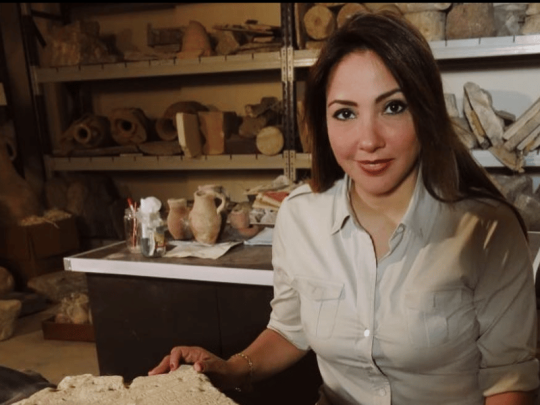
Dominican archaeologist Kathleen Martinez.
Today, the quest for Cleopatra VII Thea Philopator’s elusive burial place has been taken on primarily by Dominican archaeologist Kathleen Martinez, who has dedicated two decades of her life to this mission. Martinez subscribes to the snakebite ending. She believes the ancient queen’s suicide was a ceremonial act, part of a ritual apotheosis: shedding her mortal coil so as to ascend to the status of goddess. The ritual, Martinez theorizes, culminated in moving Cleopatra’s body from her palace to a temple 25 miles west of Alexandria, Taposiris Magna.
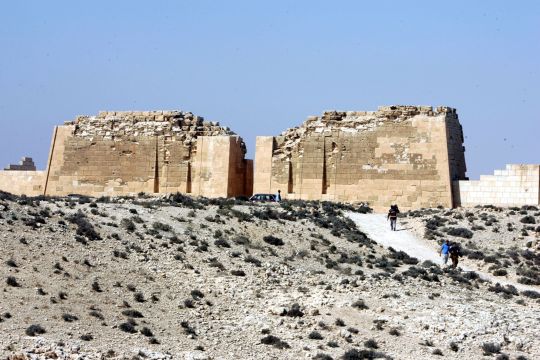


In 2022, Martinez announced the discovery of a tunnel running under the temple that she believes could have served as a corridor for delivering Cleopatra’s body. The tunnel is widely agreed to be an aqueduct, an exact replica of a similar structure found in Greece.
After working with Martinez for 11 years at Taposiris Magna, Zahi Hawass, former Minister of State for Antiquities Affairs of Egypt, now categorically disagrees with her. For one, it would be incredibly anomalous for a pharaoh to be interred at a temple. Furthermore, he asserts that there is “no evidence at all” to indicate that Cleopatra, ancient Egypt’s last pharaoh, is buried there.
“I believe now that Cleopatra was buried in her tomb that she built next to her palace and it is under the water,” Hawass lamented. “Her tomb will never be found.”
By Adnan Qiblawi.
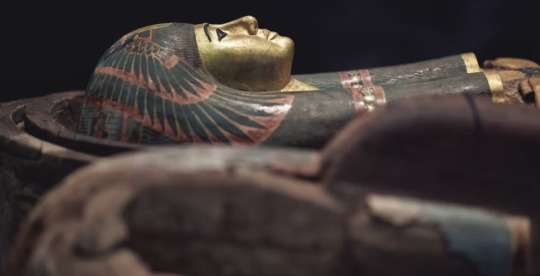
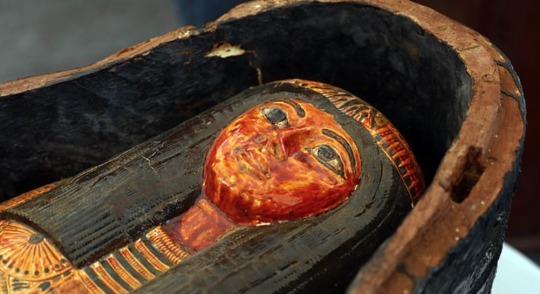
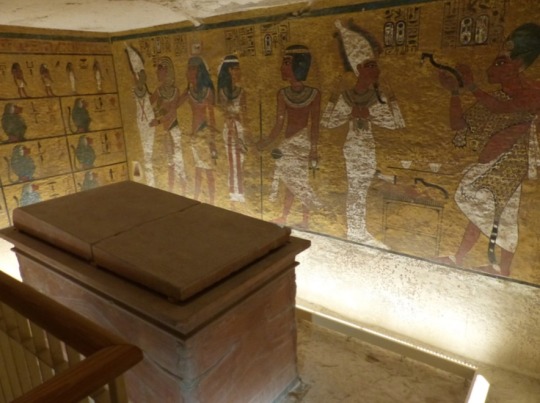
#The Hunt: Cleopatra’s Long-Lost Tomb#Queen Cleopatra#Egyptian Queen#Mark Antony#Taposiris Magna#ancient city of Alexandria#Kathleen Martinez#ancient grave#ancient tomb#ancient artifacts#archeology#archeolgst#history#history news#ancient history#ancient culture#ancient civilizations#ancient egypt#egyptian history#egyptian pharaoh
42 notes
·
View notes
Text
Five Fics Friday: December 22/23
Happy Friday everyone!! I hope you all are having a fantastic day, and I hope you guys will enjoy the fics that are on my radar this week to start off your Christmas weekend!! :D
RECENT MFLs
All I Want for Christmas (is Proof) by Raina_at (E, 6,471 w., 1 Ch. || Christmas Fluff, Porn Without Plot, Christmas Party, Gay Club, Costume Party, Mistletoe, First Time, Hand Jobs, Semi-Public Sex, Crack and Humour, Blow Jobs, Undercover for a Case) – John has been ridiculously in love with Sherlock for a while now, but he doesn't want to rock the boat if his interest isn't returned. Their newest case might be the catalyst they need to finally figure out whether they're on the same page. Or: Sherlock and John go undercover at a Christmas party in a gay club. In costume. Things... escalate.
The Way Home by Calais_Reno (M, 7,702 w., 1 Ch. || Alternate First Meeting AU || Christmas, Post-PTSD, Injury Recovery, Meeting the Parents, Coming Home, Past Drug Addiction, Developing Relationship, Moving in Together, Falling in Love, POV Sherlock Third Person) – It's Christmas Eve, and Sherlock's landlord has evicted him due to a little misunderstanding about a very small explosion that really only burned the curtains. Mrs Hudson isn't willing to let him move into 221B until after the holiday. He's left with only one alternative: go home. Spend Christmas with his family. On the train, he meets someone who might just be having an even worse holiday. Part 32 of Just Johnlock
A Case of You by Silvergirl (M, 8,165+ w., 4/8 Ch. || WiP || TEH Fix-It, Alcoholism, POV John, Anger Management, No Mary, Angst with Happy Ending) – Sherlock is marrying an American, and at the rehearsal dinner, best man John makes a drunken love confession he doesn’t remember the next day. Badly hungover, John can't find anyone to tell him what the hell happened to the wedding, where the grooms are, or how he can put it right so that Sherlock can be happy. But what if he's dead wrong about what will make Sherlock happy?
Murder Most Exquisite by PinkGloom (E, 38,343+ w., 17/22 Ch. || WiP || 1920s Egyptian Archeologist AU || Mystery, Murder, Anger Issues, Asshole Sherlock, Reincarnation, Minor Character Deaths, Alternating POV) – Retired Army Doctor John Watson works at Holmes Antiquities in Cairo. The Holmes brothers pay a visit and while they are there, mummies are unearthed. Murder, smut and a dash of adventure! (Was written with the Indian Jones trilogy, The Mummy and the amazing novels written by Elizabeth Peters in mind)
Distortion by holmesian_love (NR, 51,585 w., 23 Ch. || Post S4, Faked Suicide / Suicide Attempt, Hurt/Comfort, Medical Examination, PTSD, Psychological Horror, Blood, Spiders, Emotional Hurt/Comfort, Parentlock with Rosie, Angry John, Confusion) – John Watson is persuaded to move back into Baker Street with Rosie. The friendship -though delicate - is mending slowly after everything they've been through. That is, until strange events start happening to John which begin to disrupt the happy life they have been creating. Is there a medical explanation, or is something more sinister at play? Will they discover the cause before it tears them apart for good?
48 notes
·
View notes
Text
free summer reading groups in ancient studies
howdy <3 Saving Ancient Studies Alliance (SASA) in a volunteer-driven nonprofit that works to stimulate interest in the ancient studies and combat downward trends in humanities education across the globe. to support this mission, they're offering 16 FREE summer reading groups. check below the cut for more info.
Painted Stories: Reading Maya Mythology in Codex-Style Ceramics, June 1-29, Thursdays at 4PM EST: This reading group introduces participants to key mythological themes in Classic Maya (250-900 CE) material culture, particularly as seen on a subset of ceramic vessels known as "codex-style" vessels. No prior knowledge is necessary. RSVP HERE
The Alexander Romance, June 2-30, Fridays at 11AM EST: This reading group introduces participants to the ancient reception of Alexander the Great, with a focus on the Alexander Romance. Attend to join discussions of the ancient Macedonian hero through texts in translation. No prior knowledge is necessary. RSVP HERE
Is This Your Neighbor, Is This You? Looking at Others and Ourselves in Theoprhastus' "Characters," June 2-16, Fridays at 2PM EST: This reading group introduces participants to philosopher and natural scientist Theophrastus (371-287 BCE) and his thirty unsavory "Characters" inspired by real citizens of ancient Athens. Explore the ideas of stereotype and ethics, and examine modern methods of perception. No prior knowledge is necessary. RSVP HERE
Mother, Murderer: Medea's in Antiquity and Beyond, June 4- July 2, Sundays at 3PM EST: This reading group introduces participants to Medea, the infamous Colchian princess who endures in ancient mythology and beyond. Readings will range from Euripides and Ovid to Toni Morrison. Discussion will explore themes of revenge and gender studies. No prior knowledge is necessary. RSVP HERE
True Stories: Classical Sci-Fi and Fantasy, June 5-July 3, Mondays at 5PM EST: This reading group will introduce participants to the relationship between Classical works and the genre of science fiction. Discussions will explore similarities and differences through exciting themes of fictional empires, Roman utopia, and spaceships. No prior knowledge is necessary. RSVP HERE
Beyond the Silk Roads: June 8-July 6, Thursday at 9AM EST: This reading group will guide participants through the "Silk Roads" with a particular focus on Central Asia. Discussion will focus on pre-modern globalization, through primary source readings such as the Sogdian merchants' letters and Dunhuang texts. No prior knowledge is necessary. RSVP HERE
She's Just Not That Into You: Unrequited Love in Antiquity, June 8-July 6, Thursdays at 2PM EST:This Reading Group will guide participants through the theme of unrequited love in antiquity, and explore how tales of love and rejection are universal and timeless. Readings include translated texts of ancient poets, such as Sappho and Horace. No prior knowledge is necessary. RSVP HERE
The Pyramid Texts: The Earliest Egyptian Rituals, June 8-July 6, Thursdays at 3PM EST: This Reading Group will guide participants through the oldest religious literature in the world: the Ancient Egyptian Pyramid Texts. Discussions will explore beliefs and myths as present in the mortuary texts, and how they manifested in rituals. No prior knowledge is necessary. RSVP HERE
Tomb Robberies in Ancient Egypt: Prevention, Persecution, and Punishment, June 13-27, Tuesdays at 11:30AM EST:This Reading Group will introduce participants to the methods of Egyptology through primary texts and archaeological sources. With a focus on the Late New Kingdom, discussions will explore the questions of who and why involving tomb-robbing, and traditions of funerary practices. No prior knowledge is necessary. RSVP HERE
Atoms and Void: Lucretius' "On the Nature of Things," June 13-July 11, Tuesdays at 1PM EST: This Reading Group will introduce participants to the great Latin epic De Rerum Natura (On the Nature of Things), and its author Lucretius' key ideas of Epicureanism. Discussions will explore the poem's provocative ideas on pain and pleasure, and how they have impacted early modern science. No prior knowledge is necessary. RSVP HERE
Reading the Abbasid Past: History and Islamic Heritage, June 14-28, Wednesdays at 11AM EST:
This Reading Group will guide participants through the era of the Abbasid Caliphate, or the "Golden Age" of the Islamic World. Exploring a wide range of themes including science, philosophy, and art, discussions will explore the fascinating socio-political lives of the affluent Abbasids and their impact on present-day materials and heritage. No prior knowledge is necessary. RSVP HERE
Queer Lives and Loves in Ancient History, June 14-July 12, Wednesdays at 1PM EST: This Reading Group will use Queer Theory to explore and uncover evidence of LGBT+ lives in the Ancient World. Readings will involve Ancient Greek, Latin, and Near Eastern literature, and participants will be encouraged to challenge Western norms of identity, and modern approaches to historic interpretation. No prior knowledge is necessary. RSVP HERE
Curse Tablets: Personal Communications with the Dead and the Gods in the Ancient World, June 16-30, Fridays at 2PM EST:This Reading Group will explore the relatively unknown realm of curse tablets in the Ancient World. Through evidence left behind by women, men, and slaves over the span of 1,000 years in history, discussions will explore the motivations and consequences of such writings. No prior knowledge is necessary. (RSVP link broken)
Defying the Gods, and Forgotten Female Rage, June 18-July 30, Sundays at 11:30AM EST:This Reading Group will encourage participants to explore the representation of women in heroic tales through significant ancient texts such the Epic of Gilgamesh and Homer. Discussions will focus on the tragedy and anger of female characters in epics, who primarily appear as accessory to male heroism. No prior knowledge is necessary. RSVP HERE
From Harlots to Heroines: Royal Women in the Hebrew Bible, June 29-July 13, Thursdays at 12PM EST: This Reading Group will focus on three royal women in the biblical texts: Jezebel, Esther, and the female lover in the Song of Songs. Reading and discussions will explore primary sources, and how engendered narratives highlight writer bias and impact modern interpretations. No prior knowledge is necessary. RSVP HERE
Unlocking Beowulf, August 4-18, Fridays at 11AM EST:This Reading Group will explore Beowulf as a reflection of both the Norse and Anglo-Saxon worlds. Participants will gain a cultural and historical understanding of the poem, and explore various issues of identity, politics, gender, and nation-making in the Early Middle Ages. No prior knowledge is necessary. RSVP HERE
49 notes
·
View notes
Text
Hypatia of Alexandria, 2024 Edition
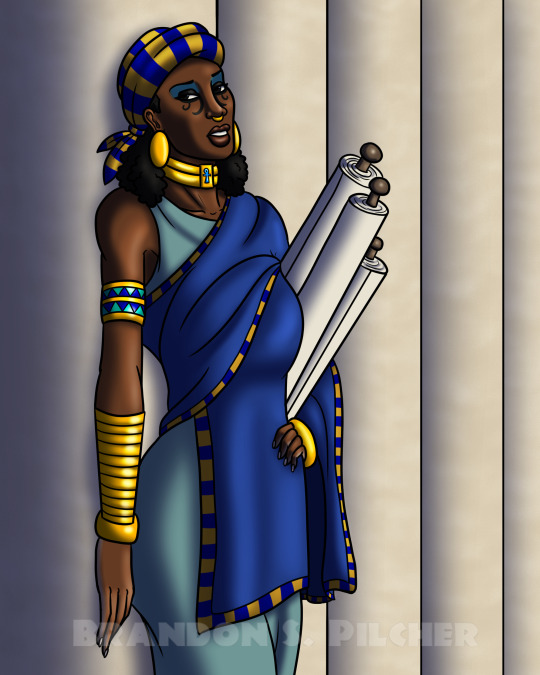
This is another depiction of mine of the scholar Hypatia of Alexandria, who lived and studied in Roman Egypt until she died in 415 AD. A teacher and scholar of Neoplatonic philosophy who also built scientific instruments such as astrolabes and hydrometers, she became an adviser to the Roman prefect Orestes, whose conflict with the Christian bishop Cyril would ultimately drag her into the early Christian community’s crosshairs. Hypatia would face a brutal death at the hands of a Christian mob who had her stripped naked and assaulted with ostraka (possibly meaning either roof tiles or oyster shells), dragged through the streets of Alexandria, and set her remains on fire. Some historians have claimed Hypatia’s murder represents the “death of classical antiquity” at the hands of religious fanaticism, but it should be noted that the mob’s reason for targeting Hypatia had more to do with her alliance with Orestes, himself a Christian, than anything she had taught as a scholar and philosopher.
We do not know much about Hypatia’s background other than that she had a father named Theon, and her physical appearance remains unknown to the best of my knowledge. Although her name is of Greek origin, there are records of indigenous Egyptians assuming Greek names during the Greco-Roman periods, so I believe it is possible that she was of Egyptian (or other African) descent rather than strictly Greek as commonly shown in artistic portrayals.
#Hypatia of Alexandria#ancient egypt#egyptian#kemet#african#black woman#woman of color#dark skin#philosopher#historical#ancient#digital art#art
7 notes
·
View notes
Text
One thing I like to try to explore is the huge diversity of the Egyptian Pantheon, and the vast history of the "Moon Knights". There is no exclusivity in the name.
Basically, Marc doesn't own/trademark name and isn't the only Knight as there is. He is just one on hundreds.
Khonshu isn't alone either. He doesn't solely own the Moon, Vengeance and the night sky association alone. There is Ptah, Yah, as well as Thoth and Osiris. So technically if you see a man with a crescent moon, it doesn't always mean that he is a follower of Khonshu, it could mean he is a follower of Ptah or Thoth. Or Artemis.
Vengeance is also mainly associated with Petbe and Horus.
Petbe is the God of Vengeance in antiquity while Horus is also called the "Avenger" for fighting Set over the murder of Osiris.
And the night sky mostly belongs to Nut (pronounced as Newt sometime). The embodiment of the night sky itself.
Infact there are like 200 gods so seeing the Ancient Egyptian world through the eyes of a foreign monotheistic belief is really, really inaccurate and wrong.
Really the first time someone tried to force the monotheism belief on the pantheon, it traumatized the entire nation to it's core because of all the bans, arrests and forced worship.
See Akhenaten and the Aten (Sun disk) Cult.
Khonshu's own cult would have been banned and surpressed during the Mad Pharaoh's attempt to turn the Kingdom Monotheistic by force. So the whole idea of a Monotheistic belief would leave a very sour and traumatizing memory for him. The move is also politically motivated so it would be more like some power struggle on who runs the Kingdom, the King or the priest.
The current Monotheistic belief is of a foreign/outside party, the Abrahamic faith isn't native to the region and the fact that at that time Egypt was colonized by Rome made it much easier than changing the entire Pantheon lore, thanks to politics and well, mass bans, arrests, forced shut down, public executions, mobs by fanatical followers burning "heretics" in public, and generally making life miserable for anyone who didn't comply (heavy taxes, lack of rights, inequality, public harassment) because the "Christians"/Empire have the bigger guns to subdue the competition.
2 notes
·
View notes
Text
GENERAL.

NAMES:
Bet'anya Agriosa ( Atlantean goddess of Wrath, Misery & the Hunt ) ; also called 'Bethany'
previous life as Bathymaas ( Egyptian goddess of Justice)
in her modern reincarnated verse she goes by 'Bethania Al-Galal'
NICKNAMES: Bet, Beth, Princess of Thebes DOB: June 25, 9527 B.C PHYSICAL FEATURES: thick dark hair, golden-green eyes, tawny skin, lean-athletic build HEIGHT: 5ft 6in tall PARENTS: Symfora & Set FC: Dina Denoire LANGUAGES SPOKEN: Egyptian/Arabic, Atlantean , Greek, Latin , English, French BACKGROUND:
Bet'anya / Bethany is the reincarnation of Bathymaas, an Egyptian goddess of justice, though for millennia she had no memory of that life after losing her love Aricles. Reborn now as an Atlantean goddess she and other gods of the Atlantean Pantheon are tasked with finding a god named Apostolos. Along the way however while in mortal form ( a blind young woman) she falls in love with the young handsome peasant soldier named Hector, who she much later discovers is actually the General Prince Styxx of Didymos, Commander of the Stygian Omada. The same young man who she waged war against when he warred against her city-state of Atlantis unknowing that he was her beloved Hector.
She eventually learned of Styxx's identity and told him that she was Set's daughter, but did not tell him she was a goddess. She planned to give up her godhood and live as a mortal with him as she was pregnant with their child, but just before their wedding, another Atlantean goddess- Apollymi , mother to the hunted Apostolos, obliterated the entire Atlantean pantheon in rage of what was done to her son.
Bethany and the other Atlantean gods existed as non-sentient statues in the island of Katoteros, the Atlantean equivalent of Olympus, for eleven thousand years. Bethany and Styxx's son was miraculously spared by Apollymi, and the child was placed in another woman to be delivered and raised.
The Atlantean gods were eventually reawakened but Bethany was not because both halves of her heart were missing. Her father, Set, had removed and hidden one half after Aricles died and Bathymaas went on a vengeful rampage; the other half died and was reborn with Styxx. The jealous greek goddess Leto had now stolen Set's half and used this to summon Bathymaas and trick her into killing Styxx. When Styxx was reborn yet again, now with his Chthonian powers that were denied to him at birth, the couple was finally reunited and Bethany was whole. They delightedly discovered their son had survived and was still alive going by the name Urian and later their second son, Aricles, was born just nine months later.
Modern /Reincarnation verse:
In which Bethany (refer to main bio) did die in the attack on the Atlantean gods and was later reborn in modern as Bethania Al-Galal. Set once again fathered her with an especially bright Egyptian-Greek historian woman who had no idea that her one night stand had been with an Egyptian god. Bethania is doted on by her mother and her step-father who loves her dearly as his own tragedy however seems forever destined to haunt all her lives as she loses both her parents in a terrible train crash in her late teens. Determined to continue their work, Bethania goes on to become an archeologist in the cut throat world of antiquities in Egypt.
One day, however, she found herself pick pocketed by a young boy who stole a small artifact off her person, she managed to catch up to him trying to sell it to a vendor in exchange for food. Moved by the state of him and his clear desperation for food she pays him for her own artifact and buys him food to eat. The eight year old, Gale Urian Peters, eventually confesses that he ran away from an orphanage, that his parents, an English man and Greek mother, had been murdered and that he had no other family. Knowing just what that was like she offers him a job as her assistant with room, board, food and pay and he delightedly accepts.
They immediately become exceptionally close and quickly slip into that of mother & son, referring to each other as such. Now Bethania (26) with her right hand & son , Gale (10), are one of Egypt's best upcoming archeologists earning more than plenty of rivals and enemies in every corner of Cairo with how eerie both are able to discover ancient sites with relative ease.
#/ bet'anya agriosa / headcanons#/ bet'anya agriosa / aesthetics#/ bet'anya agriosa / threads#/ bet'anya agriosa / musings
2 notes
·
View notes
Text
You know what, screw it! I’ll make my OWN Universal Studios shared cinematic monsterverse! Starting with the Mummy!
The Mummy; Fractured language
The movie begins with an antique dealer breaking artifacts, in order to sell the individual fragments for a higher profit. This accidently completes the rivival ritual that awakens Imhotep. The mummy then goes on a museum looting spree and killing several people. A French private collector and a totallynotatalltory minister meet in London and decide to form a small syndicate to find the one looting the artefacts and stop them. A cat and mouse chase is on between Imhotep and the syndicate as they rob and destroy artefacts in museums around world. Imhotep burning/breaking them to enact his revival rituals and the adventurers blowing them up to stop him. Imhotep realizes things are getting heated and decides to switch priorities to revive Anck su namun.
Through the film it is revealed that Imhotep was actually a priest from Ancient Nubia(?) 3,000 years ago (where modern-day Sudan is). He was exiled and died wondering the egyptian desert. 1,500 years later he is reawakened when someone accidently knocked over a pot in a museum within ancient Egypt, completing the revival ritual. Lost, he assumes the identity of a Medjay before rising through the ranks as a priest. (Note, Imhotep doesn’t introduce any ancient knowledge into Egypt, just saying “there are impressive things you can do and there are impressive things I can do”). He catches the eye on princess Anck su namun and the two agree on a mutual partnership on political grounds. This partnership evolves into a romance. Anck su namun is set to the bare the pharaohs child, who Imhotep raises as his own son. One day Anck su namun is assassinated. Hearing what happened, Imhotep attempts to flee with his son before his son is murdered too. Imhotep enacts an ambiguous revenge on the dynasty before leaving Egypt. Imhotep wonders east for the next several hundred years, reaching India before deciding to turn back to try to revive his wife and child. He finds that he cannot do it and falls into a depression. He decides to fall into a long slumber, unknowing if he’ll be awakened.
In the modern day, Imhotep is successful in reviving Anck su namun and informs her their son died shortly after her. They decide to do what they can to finish the ritual for their son, killing most of the adventurers along the way. Eventually the chase ends in the Athens Museum with the sole surviving Londoner adventurer holding the last artefact that could revive the Egyptian couple’s son. Anck su namun races towards the adventurer to try save their son, but after all the rampage he’s done Imhotep is frozen in fear. He turns on an intercom, gets on his knees and begs the adventurer to just let them revive their son and be happy. The adventurer decides to ignore it and blows up the artefact. It is quiet afterwards for a few seconds, before the adventurer hears Imhotep’s wails. It then dawns on him just what he’s done and what this actually meant to the mummy couple. Anck su namun catches up to the adventurer and rather than kill the adventurer decides to enact one of the few curses she knows. Voicing her title as the last true heir to Egypt she declares her royal punishment on the adventurer as to listen to her husband’s wails whenever the adventurer is just about to fall asleep and in his dreams. The movie ends with Imhotep and Anck su namun watching a sunset over Athens, wondering what their future is going to be.
The Mummies and the child of the night
The sequel is a wacky family adventure film. The mummy couple discover and adopt a runaway teenage Wolf Girl. She ran away because after being accepting of her sexual identity the wolf girl thought it would be safe to reveal her wolf lnature to her bio family. It wasn’t and now she is being chased across Europe by Dracula who claims she is his daughter as “a child of the night”. Hijinks ensues as the mummy family try to get Dracula of their arses. At one point Imhotep revies a holy cat, Nedjtet, who warns and wards off Dracula with other evil spirits. Nedjtet cannot speak but the wolf girl and Imhotep can understant them. There is a running gag where Imhoptep and the wolf girl fawn over Nedjtet whilst Anck su namun is pissed that Imhotep revived this specific cat because it ate their son’s favourite pet goose. At one point Imhotep shouts “fuck” in ancient Egyptian. Towards the end of the movie, Dracula’s unholy army and the mummy couple’s technically holy army fight each other. Anck su namun hears from Dracula’s unholy army that he’s a shit leader and as Pharaoh she lectures Dracula on effective leadership. Eventually the wolf girl calls off the fight, saying she will visit all her families on her own terms. The movie ends with the mummy couple vacationing in Mauritius when the wolf girl knocks on their door. Revealing her bio family is now accepting of her wolf nature, but after spending some quality time with him, she actually does fucking hate Dracula. There is another knock at the door. Imhotep opens the door to face Dracula’s unholy army with cats in baby pouches strapped to their chest. Anck su namun says in ancient Egyptian something to effect of “Oh fuck not again”.
The post credit scene is of the mummy couple with the wolf girl finally relaxing in the sun on the beach. Imhotep says something to the effect of, “When we’re happy like this, I wonder where all our troubles fly off too?” Anck su namun responds with "Oh I know", before the movie cuts the sole survivor of the first movie sitting quietly in a therapist office.
#Of course I'm always up for someone closer to the culture to have their own say in how a mummy movie should be made.#Or even if one should be made at all.#The mummy#Dracula#The wolf girl#The wolf man#universal studios#universal pictures#wolf man#wolf girl#horror#universal monsters#halloween#mummies#monster#fanfiction#synopsis as fanfiction#anck su namun#imhotep#classic movie monsters#movie monsters#dark universe#monsters
4 notes
·
View notes
Text

A model of the planned Welthauptstadt Germania
“We work beneath the earth and above it, under a roof and in the rain, with the spade, the pickaxe and the crowbar. We carry huge sacks of cement, lay bricks, put down rails, spread gravel, trample the earth . . . We are laying the foundation for some new, monstrous civilization. Only now do I realize what price was paid for building the ancient civilizations. The Egyptian pyramids, the temples, and Greek statues - what a hideous crime they were! How much blood must have poured on to the Roman roads, the bulwarks, and the city walls. Antiquity - the tremendous concentration camp where the slave was branded on the forehead by his master, and crucified for trying to escape! Antiquity - the conspiracy of free men against slaves!
You know how much I used to like Plato. Today I realize he lied. For the things of this world are not a reflection of the ideal, but a product of human sweat, blood and hard labour. It is we who built the pyramids, hewed the marble for the temples and the rocks for the imperial roads, we who pulled the oars in the galleys and dragged wooden ploughs, while they wrote dialogues and dramas, rationalized their intrigues by appeals in the name of the Fatherland, made wars over boundaries and democracies. We were filthy and died real deaths. They were 'aesthetic' and carried on subtle debates.
There can be no beauty if it is paid for by human injustice, nor truth that passes over injustice in silence, nor moral virtue that condones it.
What does ancient history say about us? It knows the crafty slave from Terence and Plautus, it knows the people's tribunes, the brothers Gracchi, and the name of one slave - Spartacus.
They are the ones who have made history, yet the murderer - Scipio - the lawmakers - Cicero or Demosthenes - are the men remembered today. We rave over the extermination of the Etruscans, the destruction of Carthage, over treason, deceit, plunder. Roman law! Yes, today too there is a law!
If the Germans win the war, what will the world know about us? They will erect huge buildings, highways, factories, soaring monuments. Our hands will be placed under every brick, and our backs will carry the steel rails and the slabs of concrete. They will kill off our families, our sick, our aged. They will murder our children.
And we shall be forgotten, drowned out by the voices of the poets, the jurists, the philosophers, the priests. They will produce their own beauty, virtue and truth. They will produce religion.” (p. 111, 112)

#borowski#tadeusz borowski#this way for the gas ladies and gentlemen#ladies and gentlemen to the gas chambers#auschwitz#germania#naziism#antisemitism#wwii#world war ii#slave labor#slave labour
6 notes
·
View notes
Text
youtube
youtube
Night Train to Memphis by Elizabeth Peters (Vicky Bliss #5)
An assistant curator of Munich's National Museum, Vicky Bliss is no expert on Egypt, but she does have a Ph.D. in solving crimes. So when an intelligence agency offers her a luxury Nile cruise if she'll help solve a murder and stop a heist of Egyptian antiquities, all 5'11" of her takes the plunge. Vicky suspects the authorities really want her to lead them to her missing lover, the art thief and master of disguises she knows only as "Sir John Smythe." And right in the shadow of the Sphinx she spots him. . . with his new flame. Vicky is so furious at this romantic stab-in-the-back, not to mention the sudden arrival of her meddling boss, Herr Dr. Schmidt, that she may overlook a danger as old as the pharaohs and as unchanging. . . a criminal who hides behind a mask of charm while moving in for the kill.
youtube
Laughter of Dead Kings by Elizabeth Peters (Vicky Bliss #6)
Who stole the mummy of King Tut? The brazen crime bears the earmarks of one Sir John Smythe, the international art thief. In fact, John Tregarth is the longtime significant other of Vicky Bliss. Innocent, he vows to clear his name by hunting down the true criminal. Vicky loses faith. But her boss, Munich Museum director Anton Z. Schmidt, "the finest swordsman in Europe", pays their luxurious way from London to Munich then Cairo, also to defend his own reputation. Once Schmidt deflects his new paramour Suzi, who only wants his body to spy on John, the entourage swells with the Egyptian officials responsible, cousins - wealthy Ashraf and poorer Feisel - plus mummy-expert mistress Saida. The Arab security guard, then a female middleman, both turn up dead. Dead hands, from her and from Tut, separately accompany notes, his is a ransom demand for millions. Kidnappers, murderers, and danger dog their way.
2 notes
·
View notes
Note
—4— Does your character carry any special items with them?
Thank you for asking <3
Abriella has a dagger that Cruz went into the Nephilim fForges and helped to craft himself. He presented it to her on her first birthday after he found her. The gift of a blade is the most treasured gift that one nephilim can give to another.
Cruz carries a pocket watch with a picture inside of he and Abriella. The watch was a gift from Arch over a century ago. As they are the two most important people in his life, he never wants to be without something to remind him of them.
Arch has a talisman from his mentor that was given to him when he completed training. It has powerful mystical properties that he has not shared with anyone. If he were ever in life threatening peril, he could call upon the mystical realm using it.
Annabella wears a locket that has a pictures of her four children that were murdered by the supernatural beasts on the night that she was offered her immortality by Jean Pierre and Armaund. A short time ago, Jean Pierre carefully and lovingly restored it, and the pictures that had started to fade. Employing some magic from practitioners in New Orleans, he was able to bring colors to the pictures and make them more lifelike. He also was able to create duplicates which he keeps safe for her in the safe in his antiques shop. There is no possession she values more.
Talon has a ring that belonged to his mother Clotho. While he has come to loathe many things she did, she was still his mother and that ring will be given to the woman that some day captures his heart.
Grae has a signet ring that belonged to his father. It has been passed down through generations of the men who have served as Chancellor to the King of Uffern.
Delilah has a pendant that belonged to her best friend Dreya that was murdered. She never take is off. It is an Egyptian cartouche with the hieroglyphs that spell out Dreya's full name. Dreya and Delilah were like sisters and her murder still haunts Delilah's nightmares. Someday she hopes to avenge her friend's death.
THE IMPERIUM CHRONICLES TAG LIST - @ceph-the-ghost-writer @kjscottwrites @writingpotato07 @saltysupercomputer @careful-pyromancer @late-to-the-fandom @autumnalwalker @perasperaadastrawriting @fearofahumanplanet @jessica-writes22 @dogmomwrites @mjjune @verba-writing @blind-the-winds @shipping-through-eternity @inkspellangel
Anyone wanting added/removed, just let me know.
#ask answered#wip ask#writeblr ask#ask open#the imperium chronicles#my writing#my ocs#my story#writeblr#writeblr connect#writeblr community#items carried
2 notes
·
View notes
Text
So now that the poll is done, I crunched the numbers and removed that hefty majority of gentile voters, to give you the results, from least to most popular:
Egypt: 4.3%
Rome: 7.6%
Greece: 17.6%
Babylon: 19.6%
Persia: 50.9%
Persia, in a poll with five options, managed to get over 50% of the (Jewish) vote. This is exactly as I expected, and why I ran the poll. I wasn't expecting to learn anything (though I did, and we will get to that later), I wanted evidence to make a point.
And that point is that Jewish cultural memory with regards to antiquity is very very different from that of most Western gentiles. The standard Western cultural narrative is all about the glories of Greece in Rome, and how Greece and Rome began and then spread European civilization. The founding narrative of Europe is one in which the forces of rational, democratic Greece took on and pushed back Persian despotism at the battles of Thermopylae and Salamis. And if the divide between East and West is Greece versus Persia at Thermopylae and Salamis, the Jews are firmly in the East.
Why is that? Why would so much of the Jewish community without hesitation pick Persia over Greece? That is a question that requires a look at Greece, Persia, and the Jewish experience of conquest.
Chronologically, the first Empire on my list of people who have ruled the Jews without their consent, is Pharaonic Egypt and it is no surprise that very few people voted for Pharaonic Egypt, since according to the Torah, the time in which we were ruled by the Egyptians is the time in which we were enslaved by them, and they were ordering the murder of our babies. the founding myth of Jewish nationhood is our divine liberation from Egypt, something we commemorate every year in one of our most significant holidays, Passover. I joked in the comments that anyone who picked this option deserves to have to keep kosher for Passover and eat matzah for the entire year.
Next came the Babylonians and Assyrians. There is a large gap between this Egyptian rule and the conquest by the Babylonians and Assyrians, long enough for the people of Israel to create a nation, and then become divided, and for these empires to come through and pick off pieces, until there was nothing left. The Babylonians in particular destroyed our Temple, and then took our people into exile in Babylon, in an event known variously as the Babylonian captivity, and the first diaspora. This was deeply traumatic for the Jewish people, but it was also in many ways the making of us. We would not have the Torah and the Tanakh as we know it today without the Babylonian exile. Still, no one remembers this as the good times.
And here's where it gets interesting, because the Jews never won our way free of Babylon. Instead Babylon was conquered while we were still there, and we were inherited by the new conqueror like that weird set of figurines your grandmother had, that you don't know what to do with now that she's gone, and that new conqueror was Cyrus the Great, first emperor of Persia, and he fucking rocked. The Babylonian Empire had this habit of pulling people into captivity and moving groups of people around their empire to prevent uprisings, and when he took power in Babylon, Cyrus the Great sent all of these people home, and gave them the rights to rebuild their institutions and their temples, and gave them a degree of local autonomy. He also outlawed slavery, and instituted ethnic and religious equality. Is it any wonder that in Jewish scripture, and among modern Jews both, Cyrus the Great is still regarded with a degree of affection and admiration?
The Hasmoneans ruled over an independent Judea for almost exactly a hundred years before Rome rocked up, conquered us, provoked us into going hey new (sort of, close enough) Greeks, same as the old Greeks, and revolted repeatedly, which the Romans put down with terrible severity, destroyed our temple, again, and dragged a whole bunch of us into exile, again, giving us all flashbacks to Babylon. This second diaspora has been much longer lasting, and many of us, including me, still live in it. this understandably means that the Jewish people are not particularly fond of Rome, and most certainly do not see ourselves as having had civilization spread to us by the Roman Empire.
But all good things, including Cyrus's Persia must come to an end, and the Empire ruled by his descendants was conquered by Alexander the (not nearly as) Great. The Jews considered this something of a downgrade, especially when Alexander's generals split his empire into multiple pieces, and started ruling those pieces as their own personal Hellenistic Greek kingdoms. the Greek kingdom that we ended up being ruled by, the Seleucids, eventually annoyed the Jews so much, that they staged a successful revolt, kicked the Greeks out, and installed their own dynasty, the Hasmoneans. this revolt is best known as the Maccabean Revolt, and it is the one that we commemorate with Hanukkah. This is why if you voted for the Hellenistic Greeks, one person in the notes is saying you need to turn in your menorah.
I think it's pretty clear at this point why Jews, especially Jews living in subsequent periods of rule by outsiders, looked back on Persia with a lot of fondness, as the good one. If you had to be ruled by an outside empire, that's the one to pick.
I want to be clear here that I am leaving out a lot of nuance, and none of this aligns perfectly with the actual events. We are talking about cultural memory, which never aligns perfectly with the actual events of history, or with historians' consensus. Cyrus, for example, had strong motives other than his personal commitment to human rights, for the policies he enacted. However, since what I am making a point about is cultural memory, and the differences between cultural memory between most Jews, and Western gentiles, it's cultural memory that I have chosen to summarize.
With that out of the way, I want to talk a little bit about what I learned, which is actually from the notes, and this is that I learned that a whole lot of Jewish people think that the Babylonian Talmud, a seminal text of Jewish scholarship and philosophy, that's still forms much of the framework from modern Jewish life, was written during the Babylonian exile. This, I am fairly certain, explains the unexpectedly high percentage of people who voted for Babylon. It was not written under the Babylonian Empire, and if you are one of the people who made this mistake, I am so sorry, your Jewish education has failed you. It was in fact written between 500 and 700 CE in the region that used to be ruled by the Babylonian empire (hence the confusing name), under the rule of the Sassanid (or Sassanian) Persians, primarily by Jewish scholars who had fled first Roman rule, and then the Christians, to live under Persian rule.
I actually debated including the Sassanids, but they actually straddle that fuzzy period between Antiquity and the early medieval period, and besides which, they didn't conquer the Jews, the Jews immigrated. The Sassanids were really really cool, and did their best to resurrect many of the forms and policies of Cyrus the Great's Persia. Several Sassanid queens were in fact Jewish. This and the Sassanid Empire, the last pre-Islamic Persian Empire, more generally, is really important for studying the historical context of the Babylonian Talmud, as well as genuinely interesting in its own right, and your average Jewish kid should be learning a lot more about them.
2K notes
·
View notes
Text

On this day:
CURSE OF THE TOMB RAIDERS
On February 17, 1923, after fourteen years of exhaustive searching, the tomb of King Tutankhamen was officially broken into. A dazzling treasure flared up before the eyes of archaeologist Howard Carter and Lord Carnarvon, financier of the expedition. The sepulcher contained caskets, vases, a gold-plated throne inlaid with precious stones, gems, furniture, clothing, weapons, four gold shrines, and much more. The sarcophagus contained three coffins. The inner one, of solid gold, held the mummified body of Tutankhamen, wrapped in a jewel-studded shroud. Over his face was a gold mask inlaid with quartz and lapis lazuli. Across his breast was a garland of flowers. After 3,300 years, the flowers still had color.
Lord Carnarvon's untimely death shortly after the opening gave credence to the Curse of King Tut, which was rumoured to protect the tomb. Numerous other people associated with the excavation of the tomb died prematurely. Ali Farmy Bey, an Egyptian prince claiming descent from the pharaohs, was murdered in his London hotel, and his brother committed suicide. Richard Bethel, who catalogued the tomb's treasures, committed suicide. Richard's father hurled himself to death from his own apartment, which contained an alabaster vase from the pharaoh's tomb.
In 1966 French officials wanted to exhibit the Tutankhamen artifacts in Paris. Mohammed Ibraham, director of antiquities of the Cairo Museum, refused. Under political pressure, he relented. Immediately following his consent, his daughter was injured in an automobile accident. Next, Ibraham dreamed that he would face terrible danger unless he stopped the exhibit. He fought the decision unsuccessfully. As he left the final meeting, he was knocked down by a car. He died two days later. The curse was revived.
Howard Carter, who should have been most affected by the curse, didn't believe in it and died of natural causes in 1939.
Text from: Almanac of the Infamous, the Incredible, and the Ignored by Juanita Rose Violins, published by Weiser Books, 2009
1 note
·
View note
Text
Former Guardian
Name: Malik Ishtar
Age: 21+
Gender: Male
Height: 5'11"
Weight: 130 lbs
Orientation: Pansexual
Family: Imseti Ishtar; father (dead), Merut Ishtar; mother (dead), Rishid Ishtar; adopted brother (alive), Isis Ishtar; sister (alive)
Personality: Rebellious, headstrong, arrogant, prideful, brash, vengeful and manipulative. His more positive personality traits are reserved more for those he is close to. In which case he can be loving, helpful, thoughtful, dutiful and kind. Malik is also quite curious, and loves reading whatever he can get his hands on. He's a consumer of knowledge in an eclectic sense. If it catches his eye, he's learning about it.
About (Past): Malik was born for the sole purpose of carrying the Pharaoh's memories carved onto his back and to continue the legacy of the Tombkeepers.
With the "murder" of his father, Malik blamed the pharaoh and went for revenge. Of course, we all know how that ended. It took the wind out of his sails for a time, but not completely.
About (Present): Now officially freed from his duties, he understands that he cannot truly run from the past and what he was. However, despite all appearances that Malik puts on, he's still quite chaotic. Years of living underground and being depraved of many experiences has made him far more lax and open -- he'll try anything at least once, which sometimes turns to bite him on the ass, of course. Dangerous or thrill-seeking behavior is a possibility of indulgence for him.
He's also still not fully redeemed. There are still sects of the Keepers who seem lost and still keep contact with him, especially the ones closest to him in age. They still consider him the defacto leader to some extent and so will often still come around or seek advice. He doesn't care for that much, but he does try to help them adjust the best he can. Even if the clans are supposed to be disbanded.
The Ghouls are also still active under Malik, but have moved on from cards to bigger things: drugs, weapons, artifacts and black market dealings with priceless antiques. . . just to name a few. He will reject the notion in public that he's still runing a criminal ring, but he still very much is.
Malik also enjoys forms of luxury. Everything in his home could be considered quality. Even the clothing and shoes he wears are expensive, and there's lots of colour. Hardly any dark clothing. He loves to smell nice, too, with expensive oils, soaps and colognes. He still wears kohl around his eyes in the way that displays his Keeper status as the leader despite disliking that role. He keeps himself clean and free of most hair (except for the hair on his head which he keeps longer), and clean in general.
Strangely in reverse to this, he may also keep some rather ridiculous things around as well. Baubles and the like, things that strike his fancy. Again, due to his deprived former state. Small amounts of clutter which are usually notes for classes, translations he does for museums or the like. Otherwise, his home is clean mostly because Isis keeps on him about it.
He keeps many different books of many authors and genres in his home, too, mostly with things on ancient Egypt that's been edited by himself with knowledge he'd gained.
Languages: He's pretty good at learning languages, all things considered. He speaks the ancient tongue (with a more upper-class dialect), Egyptian-Arabic and Japanese, with English in the process. When upset or flustered, he slips back into the ancient variant. Sometimes he may mix words, though, if he's drunk or tired, especially. So you may get Arabinese or whatever.
When concerning others: Generally speaking, he comes off as friendly and open even to strangers. Depending on the character, he may react differently.
In regards to Atem, he may act cordially to the pharaoh, but not much else. There's still a residual grudge there, even if he helped rescue him from his dark half.
In regards to Yugi, he's more open than he is with Atem. Though he doesn't talk much to Yugi due to feeling more guilty on that end. (From using Jonouchi and Anzu).
With Ryo, it's almost a sort of kindred thing. He understands what the other has gone through, and he's definitely kinder to him.
For Bakura, it's neither really hate nor exactly fondness, though he's grateful that the Spirit of the Ring tried to assist even if it was for more personal gain.
Concerning Jonouchi and Anzu, he feels guilt, so he may not come right out and be too friendly. Instead he may feel a little undeserving of their friendship.
0 notes
Text
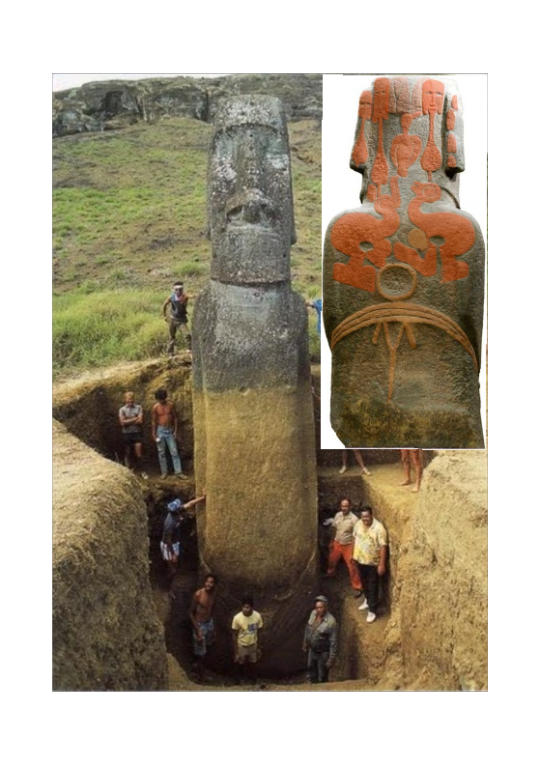
ISIS, NEPHTHYS, HATHOR, BAT, BAPHOMET AND THE WAR OF THE WOMB OF CREATION: HORUS MARDUK AMEN-RA WAS THE CHRIST THAT MURDERED HIS BRIDE
PART ONE OF FOUR
BELOW ARE SOME QUOTES AND COMMENTS THAT ADD CONTEXT TO INFORMATION I WILL TALK ABOUT.
Anti Kirist: the Egyptian Antichrist…
Strangely, each time a short allusion is made about the Isis beheading, and more precisely of the Passion of her murderer, the Jumilhac papyrus voluntarily changes the name of Horus to Anti and that of Isis. Hathor in Hesat. I remind you, it was out of the question for Egyptian scholars to clearly evoke the sufferings of the gods, because a god is not subject to pain and even less to death! Hesat represents a foster cow, both mother of the nebrid[295] and double of Hathor. This is a new form of substitution so as not to mention the tragic disappearance of Isis. Jean Hani, philosopher specializing in Greek culture and creator of the Center for Research on Classical Antiquity, addressed this question of substitution in several studies related to the thought of Plutarch. He notes in issue 76 of the Revue des Études Grecques “that at the end of the episode, after the dismemberment of the falcon god, the hero changes his identity: there is no longer any question of Anti, but Horus, who moreover covers his flesh and reappears as a young child. This syncretism, as Jacques Vandier (translator of the Jumilhac papyrus) himself notes, is not surprising in the Ptolemaic period and, in any case, it is very revealing of the attitude of the Egyptian clergy towards the myth, in a way ‘taboo’, of the Dismemberment of Horus. Anti has obviously been substituted for Horus in order to ‘unload’ the latter.[296]”.
~Corpus Deae by Anton Parks~
Egyptian Sethanic practice is one, where one adopts the concept as Set being the first rebel to question the forced authority; however, with the “foundation” essence of Seth-an, moving through other gods even including Ra and Horus, all the while finding power in the form of primordial darkness, chaos called Apep. There is the avenue of Yatukih, or dark ancient Persian sorcery, centered in Ahriman. Possibly the most therionick or ‘demonic’ of the paths, Ahriman is recognized as the counter-force, which bears divinity from his intellect and cunning. In Zurvanite traditions, he clawed from his mother’s womb before Ahura Mazda to claim the power of lord of the world. Thus, intellect in its most natural sense belongs to Ahriman.
~Anthology of Sorcery V.1: Azazel and the Rephaim by Michael W. Ford~
Sounds like he needs to take care of the people trying to put noose around people’s necks on horses, you know so that he can get rid of those fear mongers trying to rule over everybody and then be free, and live a peaceful life in harmony with nature where you dance with your loved ones free of threats of violence from ignorant fear mongers in a village with everything you need provided by the natural world.
The solar and lunar currents between which is the middle pillar which is the bar, that's all well I'm good, but because of the damage to the Dynamo of the planet people who have that activation don't have the proper connection to the planets energy field anymore unless they deliberately marry the goddess. Ever noticed that the snakes always stop short of covering that one? ENKI let the information slip about how he genetically engineered the human race to his son Marduk, who was the Horus that cut the head off of Goddess Isis. Marduk exploited the knowledge that he got from ENKI about how humans were genetically engineered to try and defeat Set- Enlil. What most people don't know is that in utilizing that knowledge, it cut him off from the goddess and nature itself. After that, Marduk exploited that knowledge to try and enslave all of human kind instead of help them in any way, because he had lost his connection to nature he went completely mad without his feminine soul. So then you have the group that is using biological drugs to pry open only the top of the middle pillar, and not even going through the natural processes of the step-by-step activation. Those people don't even have their bottom chakras active at all while at the same time having pried open higher faculties. With greater divine feminine energies from black holes entering with the age of Aquarius the energy field of the Earth is going to force everyone that wants to stay on earth to connect to it. The ones that have the step-by-step activation up the middle pillar will have the choice of whether to marry the goddess or leave the planet, but the ones that do not have the step-by-step activation and have unnaturally pride open their upper faculties will be isolated by the immune system of the earth and dealt with appropriately.
~Horus Apophis, Atum Ra~
CONTINUED IN PART TWO OF FOUR
~I am the Heart of the Hydra, the Singularity and Heart of Goddess Isis, I am AtumRa-AmenHotep, I am Aeon Horus Apophis the Lord of the Perfect Black and Pharoah of the Black Sun.
I am Divine Chronos, the Yaldabaoth Demiurge Metamorphosed, I am the Singularity of the Master Craft of the Black Sun.
Azazil-Iblis-Maymon, Abzu-Osiris-Typhon-Set-Kukulkan, Nummo-Naga-Chitauri,
Mégisti-Generator Starphire~
#illuminati #illuminator #illuminated #lightbearer #morningstar #lucifer #Draconian #anunnaki #enki #enlil #anu #inanna #dumuzi #hermes #trismegistus #Azazel #starfamily #horus #Demiurge #Sophia #archon #AI #blacksun #saturn #iblis #jinn #Maymon #ibis #thoth #egypt #esoteric #magick #dogon #dogontribe #digitaria #nummo #nommo #Naga #tiamat #serpent #dragon #gnosis #gnostic #gnosticism #Anzu #watcher #watchtower #yaldaboath #Sirius #scientology #aleistercrowley #typhon #echidna #ancientaliens #TheGrays #grayaliens #aliens #yeben #andoumboulou
0 notes